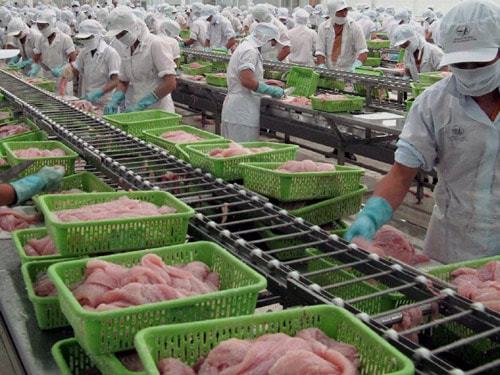VASEP protests DOC's high tax on Vietnamese pangasius fish
VASEP requested DOC to be consistent in using Bangladesh as a surrogate country to calculate the input value for Vietnamese pangasius in the final decision of the 8th and 9th administrative reviews as in previous years.

This punitive preliminary determination by DOC makes businesses
Vietnam doubts the fairness of DOC.
On September 4, 2013, the US Department of Commerce (DOC) announced the preliminary decision of the 9th administrative review (POR9), from August 1, 2011 to July 31, 2012, on anti-dumping tax (AD) on frozen pangasius fillets imported from Vietnam to the US market. Accordingly, the AD tax on frozen pangasius fillets imported from Vietnam in the preliminary decision of POR9 for the 2 mandatory respondent enterprises is 0.42 USD/kg and 2.15 USD/kg and for the voluntary respondent enterprises is 0.99 USD/kg.
The Vietnam Association of Seafood Exporters and Producers (VASEP) is very dissatisfied with the DOC's sudden change in the way it selects the replacement country, and at the same time protests the tax rate in the DOC's preliminary decision for the 9th administrative review of anti-dumping tax. Previously, VASEP and other pangasius exporting enterprises to the United States filed a lawsuit against the DOC's final POR8 ruling to the United States Court of International Trade (US CIT), requesting a review of the accuracy of the DOC's calculations, forcing the DOC to re-select a more reasonable replacement country and recalculate the tax rate. The CIT accepted the lawsuit and requested the US Customs to temporarily suspend the collection of anti-dumping tax from enterprises according to the final conclusion of POR8 until the final judgment of this Court.
According to VASEP, the decision to select Indonesia as a surrogate country to calculate the price of Vietnamese pangasius has led to an unreasonably high anti-dumping duty in this preliminary decision. In previous administrative reviews, DOC itself has repeatedly objected to selecting Indonesia as a surrogate country to calculate the input production value of Vietnamese pangasius, because this country does not have sufficient price data and lacks basic financial parameters. Moreover, Indonesia is actually only a net importer of frozen pangasius fillets from Vietnam, without exporting pangasius to the world market.
In fact, the decision to choose Indonesia as a surrogate country contradicts the DOC’s own decision on November 8, 2012, when it announced a list of six countries that would be used as surrogate countries to calculate anti-dumping duties for POR9, in which Indonesia was not on the list of six countries. The DOC itself admitted that Indonesia did not have “similar economic conditions” with Vietnam for more than half of the POR criteria.
In successive administrative reviews, DOC has always selected Bangladesh as a surrogate country to calculate the input production value of Vietnamese pangasius. Bangladesh is a producer of commercial “hypophthalmus” pangasius and raised in ponds like Vietnam, and the production costs and revenues of pangasius farmers in Vietnam and Bangladesh are similar. Therefore, there is no reason for Indonesia to be a surrogate country or for its data to be considered more reliable in this administrative review as well as in the final decision of the 8th administrative review.
This preliminary decision by DOC was influenced by the political campaign of the Catfish Farmers of America (CFA). This punitive preliminary decision by DOC has made Vietnamese businesses doubt the fairness of the DOC's review process.
VASEP emphasized that this decision of the DOC will greatly affect the bilateral relationship between Vietnam and the United States. VASEP requested that the DOC must consistently use Bangladesh as a surrogate country to calculate the input value of Vietnamese pangasius in the final decision of the 8th and 9th administrative reviews as in previous years.
According to baocongthuong-PH
